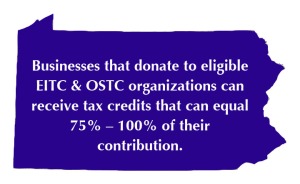In 2012, we made a commitment to explore alternatives to grants for donors focused on impact. Philanthropic grants have always been one way businesses can provide money for social impact. The Educational Improvement Tax Credit (EITC) and the Opportunity Scholarship Tax Credit (OSTC) represent two others. Here we focus on how Pennsylvania’s tax credit programs work, though several states, such as New Jersey, Virginia, and North Carolina have similar programs.
The Educational Improvement Tax Credit (EITC) Program
The EITC, which has been available since 2001, provides tax credits for donations to state-designated Scholarship Organizations, Educational Improvement Organizations, and Pre-Kindergarten Scholarship Organizations. For each of these types of organizations, the PA Department of Community Economic Development maintains a list of qualifying education organizations that have been approved to receive EITC funds.
- Scholarship Organizations are 501(c)3s that spend 80% of their EITC funds on scholarships for students whose families earn no more than $60,000 annually, plus $12,000 for each dependent. This designation can include wealthy private schools, as long as they spend 80% of the money received through the program on scholarships for eligible students.
- Educational Improvement Organizations spend 80% of the EITC funds on educational programming outside of the regular academic curriculum. Examples include Big Brothers/Big Sisters or the Arden Theater’s outreach program to public school students.
- Pre-kindergarten Scholarship Organizations include day-cares and pre-schools that serve primarily children from low-income families.
 Businesses that donate to eligible organizations can receive tax credits that can equal 75 – 100% of their contribution, depending on the type of organization they donate to, the amount of their support, and whether the business commits to contributing a second, consecutive year. Not surprisingly, these credits are claimed very quickly. For example, in Pennsylvania, applications for credits in the 2012-2013 school year started on July 2, 2012, and all credits were exhausted in one week.
Businesses that donate to eligible organizations can receive tax credits that can equal 75 – 100% of their contribution, depending on the type of organization they donate to, the amount of their support, and whether the business commits to contributing a second, consecutive year. Not surprisingly, these credits are claimed very quickly. For example, in Pennsylvania, applications for credits in the 2012-2013 school year started on July 2, 2012, and all credits were exhausted in one week.
The Opportunity Scholarship Tax Credit (OSTC) Program
Another and lesser known option for businesses in Pennsylvania is the OSTC, which was created just last year. Under this program, businesses can receive tax credits for contributions to Opportunity Scholarship Organizations, which then provide tuition assistance to students residing within the catchment area of low-performing schools. A low-performing school is any public elementary or secondary school ranking in the bottom 15% state-wide, based upon math and reading scores on the state PSSA test. Students’ families must meet the same income requirements designated by the EITC program to qualify, and can then receive scholarships of up to $8,500 (or $15,000 if they will be enrolled in a special education program). The scholarships can then be used for tuition at a private school (independent or Catholic), or “out of district” tuition for a public school in a district other than the one in which the child resides. Only six districts in PA have signed up to accept out-of-district students with OSTC scholarships, possibly due to uncertainty of the new program’s implications for logistics such as bussing and class sizes.
 Businesses can receive the same amount of tax credits under the OSTC as the EITC, but as of February, there were still $37 million in unclaimed credits out of the $50 million the state had set aside with the goal of serving 40,000 students. Given the recent national headline-grabbing budget cuts of the Philadelphia School District, the OSTC represents a still underused tool to ensure access to educational opportunity for the many students affected by school closures.
Businesses can receive the same amount of tax credits under the OSTC as the EITC, but as of February, there were still $37 million in unclaimed credits out of the $50 million the state had set aside with the goal of serving 40,000 students. Given the recent national headline-grabbing budget cuts of the Philadelphia School District, the OSTC represents a still underused tool to ensure access to educational opportunity for the many students affected by school closures.
An Opportunity for Impact
Donors interested in using these alternative vehicles should consult with their advisors to see if such tools are a good match for both their social impact and financial goals. For many businesses, such alternatives to philanthropic grants represent yet another tool for funding social impact.
Special thanks to John Song, Vice President, Wilmington Trust, and Gail D’Angelo, Regional CRA Officer, M&T Bank for generously sharing their experience and expertise with us on this topic, and to Mimi Sheng for help with research.
